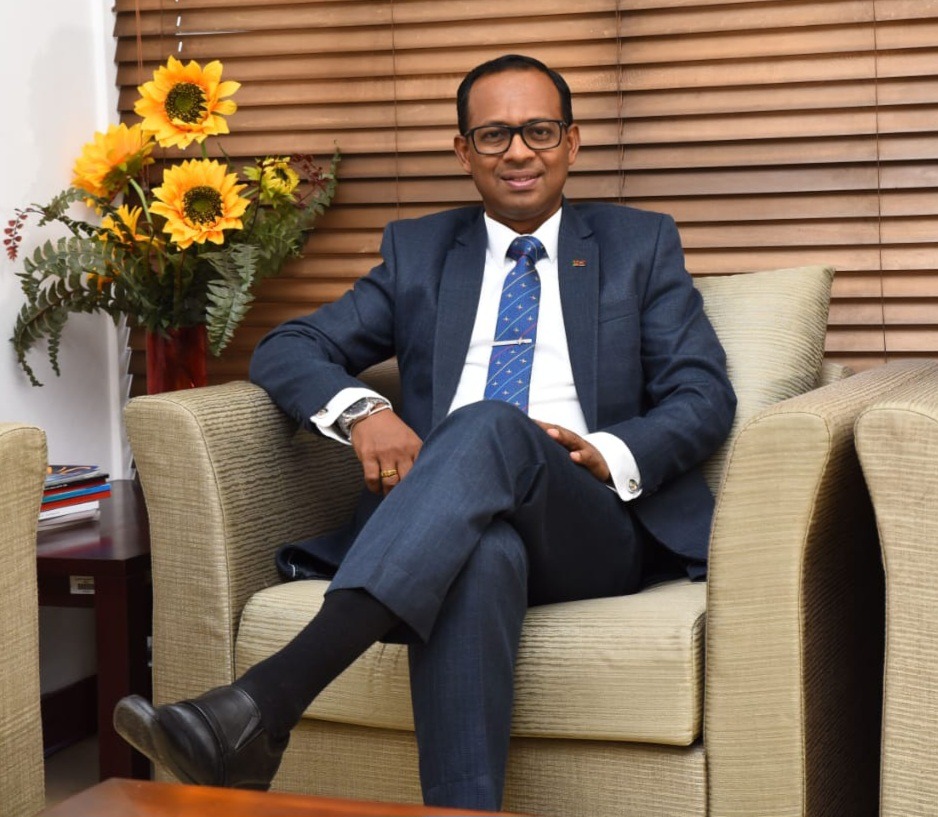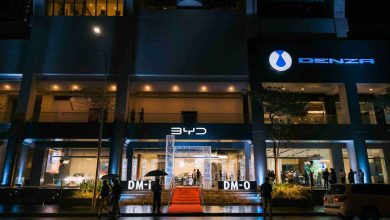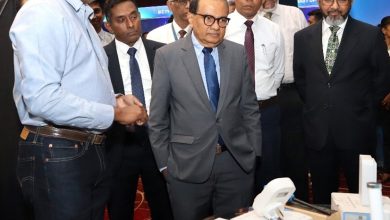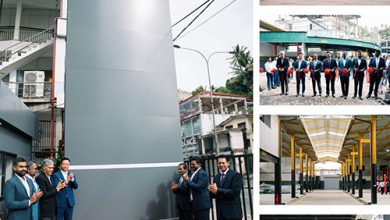BANK OF CEYLON
“Bank of Ceylon Stands as a cornerstone of Sri Lanka’s Economic Progress through Capital Formation, Inclusion and Stability”
- In conversation with Chaaminda Kumarasiri, Group Managing Director of Lanka Hospitals Corporation PLC

Chaaminda Kumarasiri, Group Managing Director of Lanka Hospitals Corporation PLC a Senior Chartered Accountant and a seasoned professional in the sector, discusses the hospital’s evolution, its collaboration with the country’s largest bank, and the shared vision of advancing healthcare and economic growth in Sri Lanka. In this interview we discuss how Bank of Ceylon has been a strategically, enabling efficient financial operations, supporting medical professionals, and strengthening the hospital’s role as a trusted national institution. In this interview,
- Lanka Hospitals has established itself as a leading healthcare institution in Sri Lanka. Could you share a brief overview of the hospital’s journey, key areas of service, and its vision for the future?
Since opening its doors in 2002 as Apollo Hospitals Colombo, Lanka Hospitals has evolved into Sri Lanka’s foremost multi-specialty tertiary care institution. Over the past two decades, it has established itself as a leader in advanced medical care, consistently raising the bar in quality, patient safety, and innovation in healthcare delivery.
Lanka Hospitals offers comprehensive medical and surgical expertise across more than 30 specialties, including cardiology, neurosurgery, oncology, orthopaedics, urology, fertility treatment, and bariatric surgery. These services are further strengthened by dedicated Centers of Excellence, such as the Heart Centre, Mother & Baby Care, Kidney Transplant & Renal Care Unit, Fertility Centre, and Bariatric Surgery programme. Each centre brings together leading consultants, specialized teams, and state-of-the-art technology to deliver outcomes that meet the highest global standards.
Diagnostic excellence is another cornerstone of the hospital’s reputation. Through Lanka Hospitals Diagnostics (LHD), Sri Lanka’s first internationally accredited medical reference laboratory, the hospital provides accurate, reliable, and internationally benchmarked diagnostic services that support both local and international healthcare needs.
Recognition from global accreditation bodies has reinforced its standing. The Joint Commission International (JCI) Gold Seal of Approval and College of American Pathologists (CAP) accreditation for LHD reflect the hospital’s commitment to rigorous quality standards, patient safety, and continuous improvement in healthcare delivery.
- How has the establishment of the Bank of Ceylon branch within Lanka Hospitals supported your operational needs, including staff salary disbursements, supplier and patient settlements, and the handling of other day-to-day financial transactions?
The Bank of Ceylon (BOC) branch within Lanka Hospitals has become a vital enabler of the hospital’s financial operations, ensuring seamless banking support that strengthens both efficiency and reliability. Its presence has allowed the hospital to manage essential functions with speed and accuracy, directly supporting uninterrupted patient care.
Through this partnership, staff salary disbursements are handled efficiently across the hospital’s large workforce, while supplier and partner settlements are processed with minimal delays, ensuring smooth business continuity. Patients too benefit from the convenience of secure, on-site payment facilities for both in-patient and out-patient services, making their experience more seamless. The branch also simplifies the handling of daily transactions, from collections at off-site medical centers to quick fund transfers required for urgent operational needs.
By combining efficiency with reliability, BOC’s on-site services have significantly enhanced cash flow management and strengthened the security of financial transactions. Most importantly, this integration of financial operations into the hospital environment has ensured that critical administrative processes are carried out without disrupting the hospital’s central focus, delivering quality patient care.
- There’s a growing trend of Sri Lankans traveling overseas for medical treatment, resulting in considerable foreign currency outflows. As a leading private healthcare provider, how do you view this situation, and what steps are being taken by Lanka Hospitals to retain these patients by offering internationally competitive services locally?
The outflow of patients seeking overseas medical treatment has long been a challenge for Sri Lanka, not only for the healthcare sector but also for the country’s foreign currency reserves. Recognizing this, Lanka Hospitals has deliberately positioned itself as a credible alternative to international medical travel by delivering advanced treatments and services within Sri Lanka.
Significant investments have been made in technology and infrastructure, with the hospital introducing cutting-edge equipment such as the state-of-the-art Gamma Camera, the ZEISS KINEVO 9900 neurosurgical system, advanced laparoscopic and bariatric suites, and comprehensive ICU facilities that meet the most rigorous international benchmarks. Alongside this, high-end medical services that once required patients to travel abroad, such as kidney transplants, advanced cardiac surgeries, in-vitro fertilization with internationally comparable success rates, and bariatric surgery programs, are now readily available at Lanka Hospitals.
These medical advancements are complemented by global accreditation standards, including the prestigious Joint Commission International (JCI) accreditation, which assures both Sri Lankan patients and international visitors of uncompromising safety and quality. To further strengthen its international reach, the hospital has established a dedicated International Patient Centre that provides personalized pre- and post-travel support, making Colombo an increasingly attractive destination for medical tourism in the region.
- As a Chartered Accountant and seasoned professional in the sector, how do you view Bank of Ceylon’s broader contribution to Sri Lanka’s economic development?
Viewed through the lenses of capital formation, inclusion, and stability, the Bank of Ceylon stands as a cornerstone of Sri Lanka’s economic progress. By mobilizing domestic savings and channeling them into productive credit, the bank sustains the growth of small and medium enterprises, exporters, and essential services. Equally important, it has served as a counter-cyclical force in times of economic stress, maintaining liquidity and stability when the country has needed it most.
Its extensive reach and robust digital infrastructure have widened access to financial services, formalized payments, and reduced transaction costs across the economy. For national institutions such as Lanka Hospitals, the impact of this partnership is deeply practical. Dependable working capital facilities, trade finance to support the import of vital medical equipment and consumables, and streamlined mechanisms for collections, payroll, and payments ensure that financial operations run without disruption.
- In what ways have BOC’s financial solutions benefitted your staff, medical professionals, and consultants, for instance, through salary accounts, loan facilities, or digital banking services tailored to their needs?
At Lanka Hospitals, the partnership with the Bank of Ceylon extends beyond institutional operations and creates tangible benefits for our people every day. For staff, salary accounts with same-day credit, fee concessions, and reliable online banking ensure that payments are both seamless and secure. Salary-linked credit facilities, including personal loans, housing and vehicle finance, and education loans, are offered at preferential rates with rapid processing, giving employees greater financial flexibility and peace of mind.
For medical professionals and consultants, BOC provides support to expand their practices by facilitating the import of specialized equipment, while also enabling cashless clinics through point-of-sale acceptance and prompt merchant settlements. These solutions make it easier for professionals to focus on patient care while managing their practices more efficiently.
On the operational front, the hospital benefits from payroll integration and bulk-payment systems that significantly reduce reconciliation time. Paperwork has been minimized through e-statements and digital request channels, streamlining processes and improving transparency.





